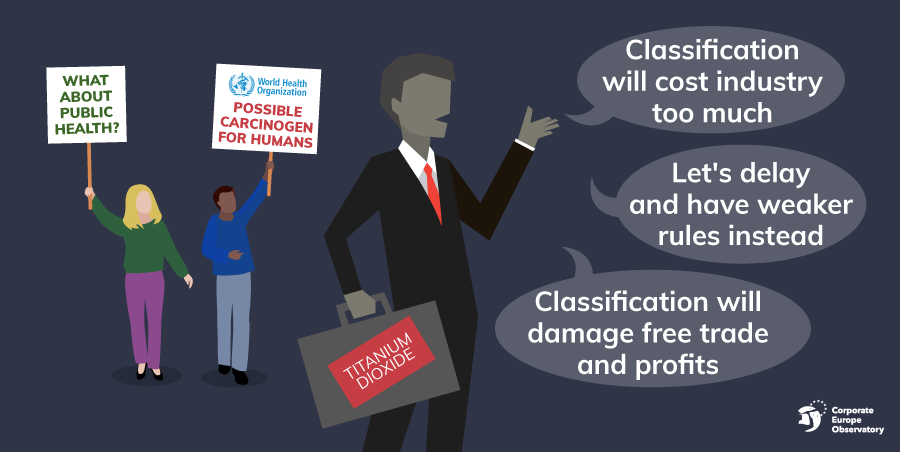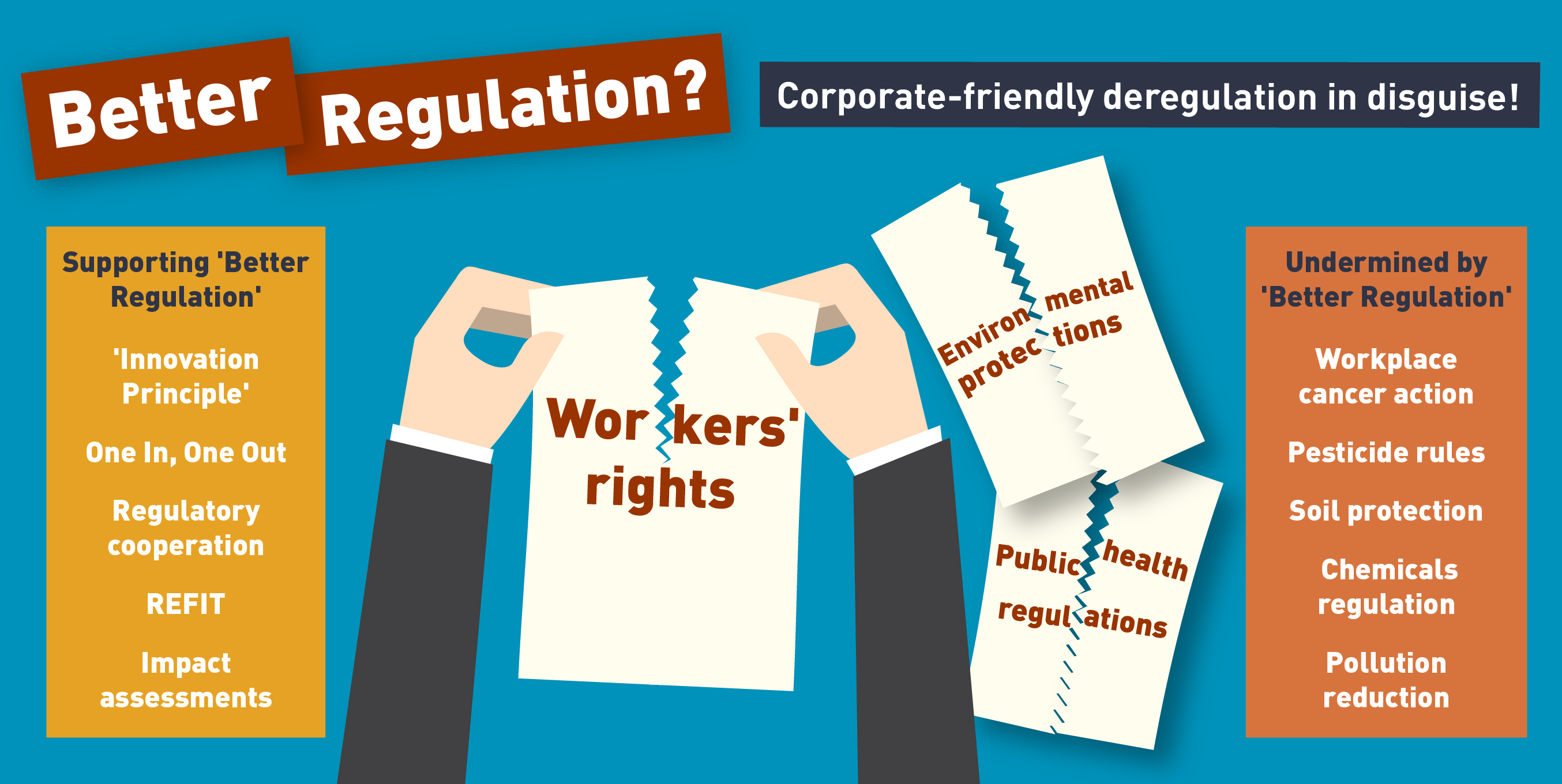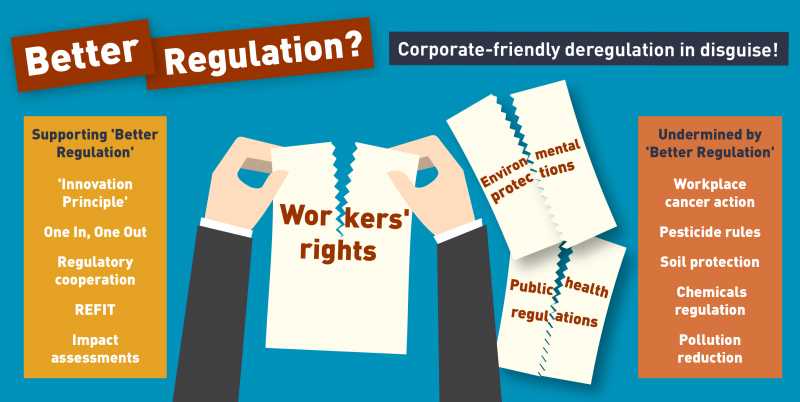The rhetoric of ‘Better Regulation’ - ‘simplification’, ‘burden reduction’, and ‘harmonisation’ - are used by industry lobbyists to delay, weaken, and avoid rules that are urgently needed on a daily basis.
Corporate sustainablity and due diligence: In 2021-22 a proposed EU law that seeks to hold companies accountable for human rights abuses, climate change, and environmental destruction has been severely watered down by corporate lobbyists, with assistance from the European Commission’s own business-friendly ‘Better regulation’ agenda which includes the Regulatory Scrutiny Board (RSB). The RSB’s deregulatory mission helps to ensure the costs of social and environmental damage caused by corporations are paid for by society, not the companies themselves. As a result a law originally intended to limit corporate impunity, requiring companies to exercise ‘due diligence’ along their global supply chains, and provide affected people with access to justice, has been left full of major loopholes. As a result of this process, far fewer companies are covered by the law and it excludes significant parts of the value chain. It also fails to make climate action part of companies’ due diligence obligations and doesn’t include obligations for short, medium, and long-term emission reduction targets. Nor does it allow companies to be taken to court in cases of failure to reduce emissions. Read more on this story in our Inside job report.
Workplace cancers: In the EU alone, over 100,000 people a year die due to insufficient protection against cancer-causing substances in the workplace, making the industries’ fight against stricter EU regulation of these carcinogens a severe threat to public health. A report by CEO Using ‘Better Regulation’ to make things worse shows how industry lobbies framed employee protection against work-related cancers as an ‘unnecessary’ burden on companies, and explained which tactics they used to hollow out the EU’s revision of the Carcinogens and Mutagens Directive. The Commission’s proposal contained exposure limits for only a small number of workplace carcinogens, and even those limits were set far too high to effectively protect workers from serious health hazards. The building blocks of ‘Better Regulation’ (impact assessments; boasting about ‘sound science’; over-emphasising business costs; an emphasis on self-regulation and voluntary measures; more ‘stakeholder’ engagement; REFIT and fitness checks) were instrumental in industry lobbying on the Carcinogens Directive. MEPs worked hard to strengthen the Commission's weak proposal, with some important improvements included in the final deal agreed with the Council.

Pesticides: A key lobby battle has been fought in recent years over EU plans to ban hazardous substances found in pesticides from products imported from third countries, provoking the wrath of pesticide producers, the US, and other trade partners. During this battle, industry repeatedly cited ‘Better Regulation’ to demand an impact assessment as part of its arguments to undermine the EU plan. To head these arguments off, the Commission pointed to the REFIT review of several pesticides regulations which has been underway since 2016. Indeed, the REFIT review has been heavily lobbied and used by industry to oppose strong regulation of pesticides. Pesticide Action Network (PAN) Europe has shown that the 53 questions and sub-questions included in the REFIT consultation were strongly biased towards finding out how ‘burdensome’ the regulations are to industry interests, rather than their usefulness for health and the environment. The REFIT review has been delayed and remains unpublished (as of February 2020). But the Commission has already backtracked on its initial proposal meaning that residues of hazardous pesticides that are banned in Europe may get tolerated in imported food and feed in the future.
Titanium dioxide: During the recent lobby battle to classify the chemical titanium dioxide, found in paint, sunscreen, toothpaste, and many other products, ‘Better Regulation’ was often cited by those wishing to delay or derail the classification. Specifically, industry lobbies queried whether the classification was “in line with the EU’s proportionality principle and Better Regulation Guidelines”. Others demanded an impact assessment, even though that would have distracted from the primary need to consider the intrinsic potential of the chemical to pose harm. Industry also introduced (irrelevant) economic arguments into the discussion. The final classification for titanium dioxide was much weaker than it should have been, following a major corporate lobby campaign focussed on the Commission and member state officials.

Data privacy: In the ongoing lobby battle on ePrivacy, industry has used ‘Better Regulation’ to argue against the proposed new regulation, instead demanding that the Commission should “leave room for and encourage effective sector-specific self-and co-regulatory initiatives” ie. a voluntary approach. As of January 2020, the ePrivacy regulation remains in deadlock in the Council, again following a major lobby campaign.
Marketing of seeds: A previous proposal by the Commission to “simplify” the entire package of existing legislation relating to the marketing of seeds in Europe ultimately failed in 2014; civil society had voiced significant concerns that such a consolidation would cement commercial seed companies’ control over the market. However, citing ‘Better Regulation’ legislation, in 2020 Council member states are now pushing the Commission to reintroduce such an initiative.
Tobacco: While World Health Organisation rules essentially forbid decision-makers from being lobbied by the tobacco industry on public health matters, tobacco lobbyists have been trying to use ‘Better Regulation’ to circumvent this. In 2015, after attending a BusinessEurope meeting with the Commission on ‘Better Regulation’, Japan International Tobacco (JTI) requested a meeting with the cabinet of Commission Vice-President Timmermans to “discuss a number of specific areas”. When the meeting happened, the JTI lobbyists raised “the placing of health warning on cigarette packs with bevelled sides”, clearly a public health issue. Essentially JTI had attempted to use the ‘Better Regulation’ agenda in its lobbying and approached Timmermans' cabinet in order to bypass the Commission's health department.
Across many, many issues, 'Better Regulation' is being used by industry lobbies as a tool by which to oppose, weaken, or delay important EU legislation.


